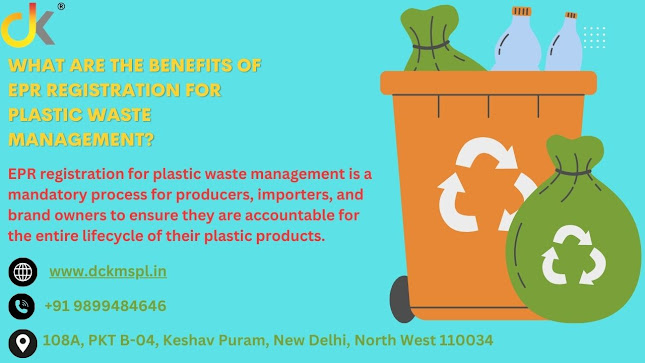In the face of increasing plastic waste pollution, Extended Producer Responsibility (EPR) has emerged as a key strategy to mitigate the environmental impact of plastic products. EPR registration compels producers to take responsibility for the entire lifecycle of their products, including the post-consumer phase. At DCKMSPL, we are committed to implementing EPR to promote sustainable waste management practices. This article provides a comprehensive overview of EPR registration for plastic waste management, highlighting its significance, benefits, and implementation process.
What is EPR Registration?
Extended Producer Responsibility (EPR) is a policy approach that places the onus of managing waste on the producers. It mandates that manufacturers, importers, and brand owners take responsibility for the collection, recycling, and disposal of their products after consumer use. EPR registration for plastic waste management formalizes this responsibility, ensuring that companies adhere to specific guidelines and standards for waste management.
Benefits of EPR Registration
Environmental Protection
- EPR reduces the environmental impact of plastic waste by encouraging producers to use eco-friendly materials and sustainable production methods. This helps decrease plastic pollution and its harmful effects on ecosystems.
Promotion of Circular Economy
- EPR fosters the recycling and reuse of plastic materials, supporting the principles of a circular economy. Producers are incentivized to design products that are easier to recycle, thereby extending the lifecycle of plastic materials and reducing the reliance on virgin plastic.
Cost Efficiency for Local Governments
- By shifting the responsibility of waste management to producers, EPR alleviates the financial burden on local governments. This allows them to allocate resources to other critical areas, ultimately benefiting the community.
Innovation and Market Competitiveness
- Companies like DCKMSPL benefit from EPR by driving innovation in sustainable product design and waste management practices. This not only enhances brand reputation but also attracts environmentally-conscious consumers, providing a competitive edge in the market.
Regulatory Compliance
- EPR ensures that companies comply with national and international waste management regulations. This helps mitigate the risk of legal penalties and enhances the company’s standing with regulatory bodies.
Corporate Social Responsibility (CSR)
- EPR aligns with CSR principles, demonstrating a company’s commitment to sustainability and social responsibility. This fosters goodwill among stakeholders and builds trust with consumers.
Resource Efficiency
- EPR encourages the efficient use of resources, leading to cost savings and a reduced environmental footprint. Efficient resource utilization is crucial for the long-term sustainability of businesses and the planet.
Implementation of EPR Registration
Assessment and Planning
- Companies must assess their product lifecycle and waste generation to develop an effective EPR strategy. This involves setting targets for waste collection, recycling, and disposal.
Registration and Compliance
- Producers must register with the appropriate regulatory authorities and comply with EPR guidelines. This includes submitting necessary documentation and reports to demonstrate adherence to waste management standards.
Waste Collection and Recycling
- Companies must establish systems for the collection, recycling, and disposal of plastic waste. This may involve partnerships with waste management firms and investment in recycling infrastructure.
Monitoring and Reporting
- Continuous monitoring and reporting are essential to ensure compliance with EPR regulations. Companies must regularly submit data on waste management activities to regulatory bodies.
Also Read- Creating A Successful EPR Plan For E-Waste Management
FAQs
1. What is EPR registration?
- EPR registration is a regulatory requirement that mandates producers to take responsibility for the entire lifecycle of their products, including post-consumer waste management.
2. Why is EPR important for plastic waste management?
- EPR is crucial for reducing plastic pollution, promoting recycling and reuse, and encouraging sustainable production practices.
3. How does EPR benefit companies like DCKMSPL?
- EPR drives innovation, enhances brand reputation, ensures regulatory compliance, and demonstrates a commitment to corporate social responsibility.
4. What are the key steps in implementing EPR?
- The key steps include assessment and planning, registration and compliance, waste collection and recycling, and monitoring and reporting.
5. How does EPR support a circular economy?
- EPR promotes the recycling and reuse of plastic materials, reducing the need for virgin plastic and supporting a sustainable, circular economy.
Conclusion
EPR registration for plastic waste management is a vital strategy for addressing the environmental challenges posed by plastic waste. At DCKMSPL, we are dedicated to leveraging EPR to drive sustainability and operational efficiency. By adopting EPR principles, we contribute to a cleaner, greener future while enhancing our market competitiveness and regulatory compliance. Embrace the benefits of EPR registration and join us in our commitment to sustainable waste management.

